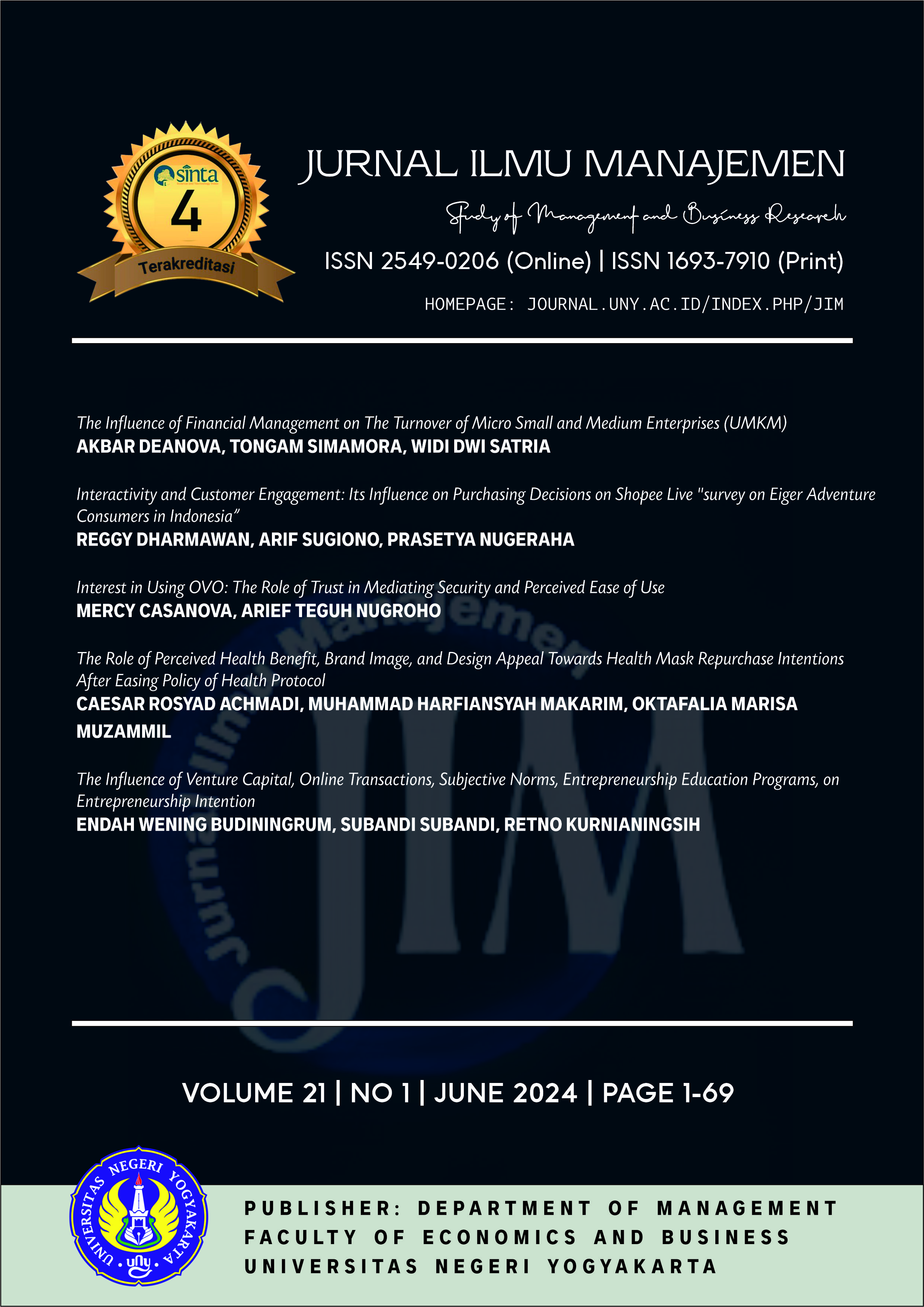THE INFLUENCE OF VENTURE CAPITAL, ONLINE TRANSACTIONS, SUBJECTIVE NORMS, ENTREPRENEURSHIP EDUCATION PROGRAMS, ON ENTREPRENEURSHIP INTENTION
DOI:
https://doi.org/10.21831/jim.v21i1.73317Abstract
The digitalization era can actually make it easier for aspiring entrepreneurs to start a business. Contrary to this, access to financing is not in accordance between government recommendations and reality in the field, where the government exempts collateral for businesses that are just starting out, while the financing channel requires a minimum business age of one year and certain collateral as reinforcement. So that most students still have a mindset as job seekers rather than creating jobs themselves, even though entrepreneurship education programs have been carried out at every level of education.
Therefore, this study aims to determine the direct or indirect effect between business capital, digital transactions, subjective norms on student entrepreneurial intentions. The results of this study are expected to contribute to how entrepreneurship education programs should be made so that students' entrepreneurial intentions can be created. This study tested 158 samples from students of the Yogyakarta Academy of Administrative Management with hypothesis testing in this study using SEM (Structural Equation Modeling). The SEM analysis tool used is SEM PLS (Partial Least Squares) WarpPLS 7.0.
The results obtained from this study are business capital and online transactions do not have a direct influence on entrepreneurial intentions. While subjective norms and entrepreneurship education programs have a direct influence on entrepreneurial intentions. Indirect influence occurs between venture capital, onlilne transactions, subjective norms to entrepreneurial intentions, as well as when through entrepreneurship education programs. Students' intentions for entrepreneurship arise when they have capital and also know how to transact online and there is support from the immediate environment and are trained in entrepreneurship education programs. For this reason, in entrepreneurship learning, training must be provided that combines capital, transactions and training programs as well as motivation from the closest people to create new entrepreneurs.
References
Alshebami, A. S., Al-Jubari, I., Alyoussef, I. Y., & Raza, M. (2020). Entrepreneurial education as a predicator of community college of Abqaiq students' entrepreneurial intention. Management Science Letters, 10(15), 3605–3612. https://doi.org/10.5267/j.msl.2020.6.033
Bachmann, N., Rose, R., Maul, V., & Hí¶lzle, K. (2024). What makes for future entrepreneurs? The role of digital competencies for entrepreneurial intention. Journal of Business Research, 174. https://doi.org/10.1016/j.jbusres.2023.114481
Baktiningsih, Yasir Arafat, A. W. (2021). Jurnal Administrasi Pendidikan. Jurnal Administrastrasi Pendidikan, 27(2), 32–41.
Bayona-Oré, S. (2023). The Theory of Planned Behaviour and the Entrepreneurial Intention of University Students. Journal of Turkish Science Education, 20(1), 136–149. https://doi.org/10.36681/tused.2023.008
Berger, E. S. C., von Briel, F., Davidsson, P., & Kuckertz, A. (2021). Digital or not – The future of entrepreneurship and innovation: Introduction to the special issue. Journal of Business Research, 125, 436–442. https://doi.org/https://doi.org/10.1016/j.jbusres.2019.12.020
Brynjolfsson, E., & McAfee, A. (2014). The second machine age: Work, progress, and prosperity in a time of brilliant technologies. In The second machine age: Work, progress, and prosperity in a time of brilliant technologies. W W Norton & Co.
Cahyani, E., & Sari, N. (2017). Determinan Motivasi terhadap Minat Berwirausaha Mahasiswa pada Perguruan Timggi Swasta si Sumatera Selatan. Jurnal Ekonomi Manajemen Dan Akuntansi, XXIV(43), 1–19. https://www.academia.edu/download/55869479/DETERMINAN_MOTIVASI_TERHADAP_MINAT_BERWIRAUSAHA_MAHASISWA_PADA_PERGURUAN_TINGGI_SWASTA_DI_SUMATERA_SELATAN.pdf
Elia, G., Margherita, A., & Passiante, G. (2020). Digital entrepreneurship ecosystem: How digital technologies and collective intelligence are reshaping the entrepreneurial process. Technological Forecasting and Social Change, 150, 119791. https://doi.org/https://doi.org/10.1016/j.techfore.2019.119791
Fan, J., Hu, J., & Wang, J. (2024). How Entrepreneurshi[ Education Affects College Students Entrepreneur Intention: Sample from China. HELIYON, e30776. https://doi.org/10.1016/j.heliyon.2024.e30776
Gunawan, W. A. (2023). Analisis Faktor Yang Mempengaruhi Niat Berwirausaha Dan Keputusan Untuk Melakukan Bisnis Rumahan (Home-Based Business). https://dspace.uii.ac.id/handle/123456789/43279%0Ahttps://dspace.uii.ac.id/bitstream/handle/123456789/43279/17312285.pdf?sequence=1&isAllowed=y
Hair, J. F., Black, W. C., Babin, B. J., & Anderson, R. E. (2013). Multivariate Data Analysis. Pearson Education Limited. https://books.google.co.id/books?id=VvXZnQEACAAJ
Indra, A. R., & D.W.P, S. (2016). Pengaruh Pendidikan Kewirausahaan Dan Pelaksanaan Kegiatan Business Center Terhadap Minat Berwirausaha Siswa Kelas Xi Jurusan Pemasaran Smk Negeri 2 Semarang Tahun Ajaran 2015/2016. Journal of Economic Education, 5(1), 39–51. https://journal.unnes.ac.id/sju/index.php/jeec/article/view/13018/7111
Jogiyanto, H. (2011). Konsep Dan Aplikasi Structural Equation Modeling : Berbasis Varian Dalam Penelitian Bisnis. Yogyakarta : UPP STIM YKPN.
Joni, A. Y., Syuhada, S., & Kurniadi, R. (2022). Pengaruh Modal Usaha dan Dukungan Keluarga Terhadap Minat Berwirausaha Pada Mahasiswa Pendidikan Ekonomi Angkatan 2019-2022 Universitas Jambi The Influence Of Business Capital and Family Support On Entrepreneurial Interest In Economics Education Students Class Of 2019-2022 , University Of Jambi.
Lubis, P. K. D., & Maha, J. M. (2021). Pengaruh Mental Dan Modal Berwirausaha Terhadap Minat Berwirausaha Dengan Motivasi Sebagai Variabel Intervening Pada Mahasiswa Pendidikan .... Jurnal UNIMED, 10(1), 50–61. https://www.academia.edu/download/79395153/15445.pdf
Malla Avila, D. E. (2022). Pengaruh Kreatifitas dan Modal Usaha Terhadap Minat Berwirausaha Mahasiswa Fakultas Ekonomi dan Bisnis Islam UIN STS Jambi. ×”×רץ, 8.5.2017, 2003–2005.
Meifa, Y. T., & Sanjaya, V. F. (2022). Pengaruh Modal Usaha, Lingkungan dan Self Afficacy terhadap Minat Berwirausaha. REVENUE: Jurnal Manajemen Bisnis Islam, 3(1), 43–64. https://doi.org/10.24042/revenue.v3i1.10459
Mualifah, A. U., & Prasetyoningrum, A. K. (2021). Analisis Pengaruh Jiwa Wirausaha, Akses Modal, dan Ekspektasi Pendapatan terhadap Minat Berwirausaha (Studi Kasus pada Masyarakat Desa Kletek Kecamatan Pucakwangi Kabupaten Pati). Jurnal Industri Kreatif Dan Kewirausahaan, 3(1), 9–22. https://doi.org/10.36441/kewirausahaan.v3i1.64
Munawar, A. (2019). Pengaruh Pendidikan Kewirausahaandan Self Efficasy terhadap Minat Berwirausaha Siswa. Prosiding Seminar Nasional Pendidikan KALUNI, 2. https://doi.org/10.30998/prokaluni.v2i0.105
Nambisan, S. (2017). Digital Entrepreneurship: Toward a Digital Technology Perspective of Entrepreneurship. Entrepreneurship Theory and Practice, 41(6), 1029–1055. https://doi.org/10.1111/etap.12254
Novitasari, A. T. (2023). Peran Modal Usaha Terhadap Minat Berwirausaha Batik Tulis Tanjung Bumi. Journal on Education, 6(1), 2295–2302. https://doi.org/10.31004/joe.v6i1.2836
Pratiwi, Y., & Wardana, I. M. (2016). Pengaruh Faktor Internal dan Eksternal terhadap Minat Mahasiswa Fakultas Ekonomi dan Bisnis Universitas Udayana. E-Jurnal Manajemen Unud, 5(8), 5215–5242. https://media.neliti.com/media/publications/24727
Prihartini, E., & Sopiyan, P. (2023). Pengaruh Motivasi Dan Modal Usaha Terhadap Keputusan Berwirausaha. J-Aksi : Jurnal Akuntansi Dan Sistem Informasi, 4(2), 143–149. https://doi.org/10.31949/jaksi.v4i2.5393
Raappana, A., & Pihkala, T. (2024). Three explanations for the development of adolescents' entrepreneurial potential. International Journal of Educational Research, 123. https://doi.org/10.1016/j.ijer.2023.102272
Rahayu, E. (2022). Analisis Pengaruh E-Commerce terhadap Minat Berwirausaha Mahasiswadalam Perspektif Ekonomi Islam. In Repository UIN Raden Intan Lampung. (Issue July). http://repository.radenintan.ac.id/20704/1/skripsi 1-2.pdf
Ripollés, M., & Blesa, A. (2024). The role of teaching methods and students' learning motivation in turning an environmental mindset into entrepreneurial actions. International Journal of Management Education, 22(2). https://doi.org/10.1016/j.ijme.2024.100961
Rochanawati, I. (2023). Pengaruh Modal Terhadap Minat Wirausaha Pada Pelaku Usaha Pastry dan Bakery di Kota Padang. Jurnal Penelitian Dan Pengembangan Sains Dan Humaniora, 6(3), 374–378. https://doi.org/10.23887/jppsh.v6i3.53362
Sari, D. C. K., & Wibawa, S. C. (2017). Pengaruh Penggunaan E-commerce Dalam Proses Penjualan Terhadap Minat Berwirausaha Siswa SMK Negeri Ngraho. It-Edu, 2., 2(April), 49–58. https://dspace.uii.ac.id/bitstream/handle/123456789/25104/%5BCetak Perpusnas%5D Ekonomi Islami Solusi Tantangan Zaman.pdf?sequence=1&isAllowed=y#page=71
Setiawan, R., & Malik, A. (2021). Pengaruh Ekspektasi Pendapatan Terhadap Minat Berwirausaha Pada Masyarakat (Studi Kasus Pada Desa Tumpatan Nibung Dusun Vi Kecamatan Batang Kuis Kabupaten Deli Serdang Sumatera Utara. JEKKP (Jurnal Ekonomi, Keuangan Dan Kebijakan Publik), 3(1), 32–37. https://doi.org/10.30743/jekkp.v3i1.4073
Sholihin, M., dan D. R. (2013). Analisis SEM-PLS Dengan WarpPLS 3.0 : Untuk Hubungan Nonlinier Dalam Penelitian Sosial (Seno (ed.)). Yogyakatra : Andi Offset.
Siagian, N., & Manalu, D. (2021). Pengaruh Motivasi Dan Modal Usaha Terhadap Minat Berwirausaha Di Pasar Komplek Mmtc Kota Medan. Jurnal Ilmu Sosial Dan Politik, 1(1), 81–95. https://doi.org/10.51622/jispol.v1i1.330
Tania Putri, G. (2022). Pengaruh Bisnis E-Commerce dan Self Efficacy terhadap Minat Menjadi Wirausaha Mahasiswa Pendidikan Ekonomi Universitas Negeri Padang. Jurnal Salingka Nagari, 1(2), 407–416.
Thompson, E. R. (2009). Individual entrepreneurial intent: Construct clarification and development of an internationally reliable metric. Entrepreneurship: Theory and Practice, 33(3), 669–694. https://doi.org/10.1111/j.1540-6520.2009.00321.x
Tseng, T. H., Wang, Y. M., Lin, H. H., Lin, S. jeng, Wang, Y. S., & Tsai, T. H. (2022). Relationships between locus of control, theory of planned behavior, and cyber entrepreneurial intention: The moderating role of cyber entrepreneurship education. International Journal of Management Education, 20(3). https://doi.org/10.1016/j.ijme.2022.100682
Villanueva-Flores, M., Hernández-Roque, D., Díaz-Fernández, M., & Bornay-Barrachina, M. (2023). Exploring the mediation role of perceived behavioural control and subjective norms in the relationship between psychological capital and entrepreneurial intention of university students. The International Journal of Management Education, 21(3), 100865. https://doi.org/https://doi.org/10.1016/j.ijme.2023.100865
von Briel, F., Davidsson, P., & Recker, J. (2018). Digital technologies as external enablers of new venture creation in the it hardware sector. Entrepreneurship: Theory and Practice, 42(1), 47–69. https://doi.org/10.1177/1042258717732779
Vu, T. H., Do, A. D., Ha, D. L., Hoang, D. T., Van Le, T. A., & Le, T. T. H. (2024). Antecedents of digital entrepreneurial intention among engineering students. International Journal of Information Management Data Insights, 4(1). https://doi.org/10.1016/j.jjimei.2024.100233
Zhang, W., Li, Y., Zeng, Q., Zhang, M., & Lu, X. (2022). Relationship between Entrepreneurship Education and Entrepreneurial Intention among College Students: A Meta-Analysis. International Journal of Environmental Research and Public Health, 19(19). https://doi.org/10.3390/ijerph191912158
Downloads
Published
How to Cite
Issue
Section
License
An author who publishes in the journal "Jurnal Ilmu Manajemen (JIM)" agrees to the following terms:
Author retains the copyright and grants the journal the right of first publication of the work simultaneously licensed under the Creative Commons Attribution-ShareAlike 4.0 License that allows others to share the work with an acknowledgement of the work's authorship and initial publication in this journal.
Author is able to enter into separate, additional contractual arrangements for the non-exclusive distribution of the journal's published version of the work (e.g., post it to an institutional repository or publish it in a book) with the acknowledgement of its initial publication in this journal.
Author is permitted and encouraged to post his/her work online (e.g., in institutional repositories or on their website) prior to and during the submission process, as it can lead to productive exchanges, as well as earlier and greater citation of the published work (See The Effect of Open Access).
All materials in this site are protected by the law. It is prohibited to quote a part of or all of this website contents for commercial purposes without the permission or consent of the editors.
If anyone finds one article or more in this journal violate or potentially violate one's copyrights, please report to us through e-mail of Principle Contact.
Legal-formal aspects of accessing any information and manuscript in this journal website refer to the provision of license Creative Commons Attribution-Share Alike (CC BY-SA). Read more about the Creative Commons Attribution-ShareAlike 4.0 Licence here: https://creativecommons.org/licenses/by-sa/4.0/.
All information available in 'Jurnal Ilmu Ekonomi (JIM)' is academic in nature. 'Jurnal Ilmu Ekonomi (JIM)' is not responsible for loss due to the abuse of information in the website.



.png)

